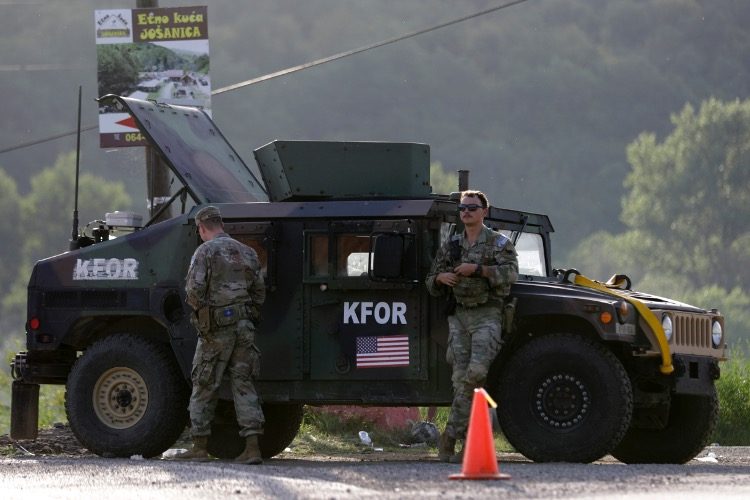
Around 200 British soldiers from the 1st Battalion of the Princess of Wales’ Royal Regiment reached Kosovo last Friday, October 6, to join existing NATO troops there, with a Turkish general, Özkan Ulutaş, slated to assume the role of overseeing the troops this week.
Last week, Romania also vowed to dispatch 100 additional troops.
These mobilizations “are a prudent step to ensure KFOR (Kosovo Force) has the forces it needs to fulfill its UN mandate to maintain a safe and secure environment and freedom of movement for all people in Kosovo,” NATO declared in a statement.
London and Bucharest vowed military reinforcements after a September 24 episode in Banjska when three Serbs and one ethnic Albanian police officer lost their lives. Serbia insisted that a group of Serbs were establishing a barricade to ward off raids by Kosovan troops when these troops incited a shootout. On its end, Kosovo maintained that a group of 30 Serb gunmen fired initially, killing the police officer before occupying a monastery for some hours and then retreating on foot.
Kosovo slammed the gunmen as “Serbian state-backed troops,” with Kosovan Prime Minister Albin Kurti claiming that Belgrade was responsible for the “terrorist attack” on Kosovo. In contrast, Serbia rejected any connection between the group and Belgrade, stating that “Kurti is the only one to blame” for the fatal clash, adding that “his only desire is to drag us into a war with NATO.”
Serbian President Aleksandar Vučić dismissed Kosovo’s claims, stating that local Serbs may have retaliated against Pristina’s suppression, which he slammed KFOR for sanctioning.
A NATO peacekeeping force stationed in Kosovo ignored a police clampdown on local Serbs, Vučić claimed.
The Serbian leader also slammed the NATO-led KFOR, which has been in the region for more than 20 years, for backing Pristina. Vučić said that Serbs in Banjska “were completely surrounded in an hour and 20 minutes,” insisting that it was “obviously done in cooperation with international forces.”
KFOR’s present commander, Italian General Angelo Michele Ristuccia, told Albanian media on October 6 that NATO’s presence had “stopped the events from escalating” in Banjska. Ristuccia is scheduled to hand over command to Ulutaş on October 10.
Türkiye has about 600 troops as part of KFOR’s 4,500-strong contingent. Although Ankara has enjoyed warm economic ties with Belgrade, it has also provided Pristina with Bayraktar combat drones.
Albanian Prime Minister Edi Rama and Serbia’s Vučić urged KFOR to assume policing duties in the Serb-populated northern regions of Kosovo, after the September 24 clash between Kosovan police and armed Serbs. Vučić declared that he preferred this option to having police loyal to Kosovo’s Kurti, whom he denounced for “terrorizing” the local Serbs. For his part, Rama contended that this arrangement was the only method to prevent Serbian militants from assaulting ethnic Albanian police.
“KFOR must take control of the north of Kosovo,” Rama declared at a press conference in Tirana. “It is a proposal that I have made before,” he added, stating that “even some voices have asked for it from the Serbian side.”
Moreover, Rama contended that should KFOR not step in, the Serb minority in northern Kosovo would ultimately stage an assault on Kosovan police, requiring a far larger intervention by NATO in future.
Following a meeting with envoys from the Quint group, which includes the United States, the U.K., France, Germany, and Italy, Vučić said, “I reiterated Serbia’s views on the latest events in Kosovo and Metohija and requested that KFOR take care of all security issues in the north of Kosovo instead of Kurti’s police.”
Notwithstanding longstanding tensions between Serbia and NATO, Vučić regards KFOR as less threatening to Kosovo’s Serb minority than Kurti’s forces. Had KFOR come across the Serb barricades on September 24 instead of Kosovo police, Vučić insisted, “there would have been much fewer victims.”
After the Banjska incident, Austrian economist and social media personality Günther Fehlinger, who characterizes himself on social media as “Founder [of the] European Committee for NATO Enlargement for Kosovo, Ukraine, Armenia, Austria, [and] Moldova” condemned Belgrade and Moscow of staging the incident.
“[The] Serb war against Kosovo has started in Banjska,” he posted on X (formerly Twitter). “As I warned all year, Russia and Serbia want [a] Southern Front — now it is there!”
“I call [on] NATO to prepare intervention against Serbia immediately,” he elaborated, concluding, “Bomb Belgrade now!”
Fehlinger has made similar provocative statements online in the past, including calls to dismantle entire countries that object to NATO enlargement or continue to trade with Russia. While he has worked with various organizations advocating for EU and NATO enlargement, many critics see him as a provocateur.
Echoing Fehlinger’s views was Kosovo’s Kurti, who alleged that the September 24 assailants had supposedly enjoyed “political, financial and logistical support from official Belgrade.”
In June 1999, NATO sent troops into Kosovo following a 78-day air war against Serbia on behalf of ethnic Albanian separatists in that area. Kosovo’s 2008 unilateral independence claim has not been acknowledged by Serbia or many of the world’s countries, including Russia, China, and India.
Decades of Ottoman rule, Albanian-led pogroms during the Second World War, as well as a NATO air strike against Serbia in 1999 have made Serbs a minority in Kosovo, despite the area being the venue of the earliest known Serb religious sites. Vučić and other Serb leaders in Kosovo have been cautioning that Kurti plans to expel the remaining Serbs out of the province, with local Serbs constantly establishing barricades to prevent raids by Kurti’s forces.



